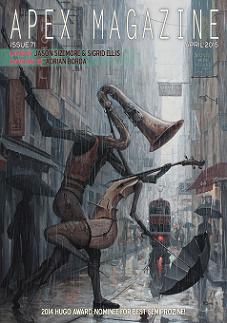Reviewed by Clancy Weeks
Why does an angel fall? The more important question is: why would they choose to do so? In “Beatification of the Second Fall” by Sean Robinson we are given reasons that are both difficult, and painful, to fathom. We first meet Learner as a boy of four, and watch him grow into a man while his mother, known only as Sister Judith, uses the fallen angel she keeps tied to a bed as a source of income. Judith, you see, sells pieces of the angel for miracle cures, and over the next twenty years whittles away at him while her son watches. The angel not only endures this, but refuses to escape, even when Learner offers. He is, of course, waiting for something. There is a lot going on here in a very small space, and I appreciate the woven layers and depth of meaning. Great storytelling, with strong characters. I only have two gripes, one minor and one major. The minor is the editing. There were a couple of places where a word was obviously left out, completely taking me out of the story while I thought about the mechanics. The major problem is that, in twenty years, someone would have spilled the beans about an angel tied to a bed to someone in a position of authority. Even if they didn’t believe in angels, they would have to at least investigate, right? This one issue kept pulling me out of what was, overall, a great and well-written story. Still… there’s a lot to like here.
A. C. Wise crafts a very nicely written tale of phantom pain in her story, “Silver Buttons All Down His Back.” When I say “phantom pain,” though, I’m not just talking about the textbook variety. Here we deal with all pains of the imagined variety, and we find that pain is not reserved only for the physically afflicted. Devon is a young man who longs to be loved despite his handicap, and Gary is the man Devon wants to be. Gary is equally handicapped, but his problems are just not visible. I want to say, first, that I really like this story; however, if you take away the SF elements, the story remains just as strong as before. That’s a good indicator that this is not truly SF, but a great story with an SF wrapper. Either way, it is well-written and worth reading.
“Crow” by Octavia Cade tells the tale of Carmen, Lydia, the all-woman crew of the fishing boat Brizo, and the Crow that guides and rules their catch. In this world, over-fishing is dealt with harshly, and conservation is prized. The Crow on each boat steers them to good locations, then tells them the limit of their catch. Carmen has just returned from shore leave, where she gave birth to a child, and she is honored as a tiller who can give milk to the sea. Lydia keeps the Crow free of rust, polishing it (and being polished in return) high up in the nest. This is a well-built world, rich with detail in a short story. Too bad it doesn’t have an ending. As the start of a novel it’s great, but as a short story it falls a little flat. As usual with Apex, though, they sure can pick people who can write a beautiful scene.
If the previous story is the beginning of a novel, “Wind” by Naomi Kritzer is a great outline. Gytha and Dagmar are two young girls who both desire to be something more, and in an impatient mood they cast a spell to make it happen. Gytha gives Dagmar all her Earth, and Dagmar gives Gytha all her Air. Each is left with the magical abilities they desire, but the side-effects end their friendship. It takes a very special visitor to give Dagmar the opportunity to become whole again. There is some great world-building, and the characters are (mostly) well-defined, but the storytelling feels stilted. Yes, it seems to be told in the form of a parable or fairytale, but at times seems more like an outline of a story. While the ending was not unanticipated, it was still nicely done.
“Slow” by Lia Swope Mitchell is beautifully horrible. Jen is an artist, a sculptor, and like all artists, their creations are the thing—the most important thing—driving their lives. Dan is her latest creation, and we meet him over time as he emerges from the stone bit by bit and weaves the tale. As an artist (a composer by training) I relate to a story about investing one’s self completely in a work of art, and Mitchell does an amazing job of grasping this and making it real. This is a wonderful story that is made even stronger through its gratifying, though painful, ending. This is the longest story in the issue, and reads the fastest, maintaining interest throughout. I can’t imagine doing what Jen does at the end, and it grips me all the more for it. Very well done, and recommended.
Clancy Weeks is a composer by training, with over two-dozen published works for wind ensemble and orchestra, and an author only in his fevered imagination. Having read SF/F for nearly fifty years, he figured “What the hell, I can do that,” and has set out to prove that, well… maybe not so much. He currently resides in Texas, but don’t hold that against him.
 Apex Magazine
Apex Magazine